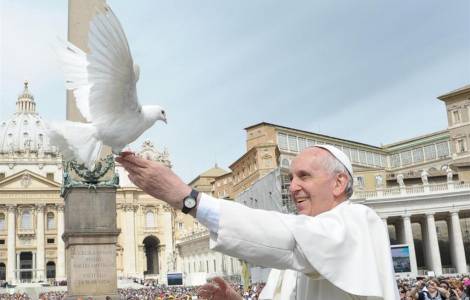
by Fabio Beretta
Vatican City (Agenzia Fides) – Cancelation of debts as a path to peace. This is what Pope Francis, like his predecessors, had called for for the upcoming Jubilee Year. The Pontiff also formulates this request in black and white in the Bull of Proclamation for the Jubilee Year that the Catholic Church will soon celebrate on January 1, 2025: “Forgive us our trespasses: grant us your peace”.
The theme chosen by the Holy Father for the forthcoming World Day of Peace 2025, as stated in a press release issued by the Dicastery for Promoting Integral Human Development
explains that this title corresponds to "the biblical and ecclesial understanding of the Jubilee Year" and is inspired by the Encyclicals "Laudato Sì" and above all by the concepts of Hope and Forgiveness which are at the heart of the Jubilee, a time for conversion that calls us not to condemn, but instead to bring about reconciliation and peace".
"When considering the reality of conflicts and social sins afflicting humanity today in light of the hope inherent in the Jubilee tradition of the forgiveness of sins and the cancellation of debts, together with the reflections of the Fathers of the Church in this regard", the statement continues "concrete principles emerge that can lead to a much needed spiritual, social, economic, ecological and cultural change".
It is well known that the most developed nations spend billions on arms sales every year. This is also confirmed by the report published in April 2024 by the Stockholm Peace Research Institute: in 2023, a year in which two wars were fought on the borders of Europe, a good $2,443 billion (2,293 billion euros) was spent on armaments worldwide. This represents an increase of almost 7%. Never before has so much been spent on armaments.
Data that help us better understand what Pope Francis recently denounced: "The violence caused by wars clearly shows how much arrogance moves those who consider themselves powerful in the eyes of men, while they are pathetic in the eyes of God. How many new poor people are caused by this bad policy made with weapons, how many innocent victims! But we must not back down".
For this reason, the Pope also called for a moratorium to cancel or drastically reduce the foreign debts of the poorest countries. Francis had reiterated this not only in the bull for the Jubilee Year, but also just a few weeks ago when he received the participants of a seminar organized by the Pontifical Academy of Sciences on the debt crisis and the global south before the general audience.
"After poorly managed globalization, pandemics and wars, today we are faced with a debt crisis that affects mainly the countries of the South of the world, generating misery and fear and depriving millions of people of the possibility of a dignified future," the Pope lamented, which is why it is urgent to create "a multinational mechanism based on solidarity and harmony among peoples, which takes into account the global importance of the problem and its economic, financial and social impact" in order to break the vicious circle of financing that leads to indebtedness and to avoid a "every man for himself" approach in which "the weakest always lose".
In other words, in view of the Jubilee Year that begins in a few months, we need "a new international financial architecture that is courageous and creative" and which, precisely in view of the Jubilee Year, can lead to a kind of moratorium, that is, a cancellation or reduction of the foreign debt of the poorest countries.
"Ecological debt and foreign debt are two sides of the same coin that mortgage the future," warned the Pope, who recalled that debt cancellation during the Jubilee Year is a tradition of the Jewish people. He appealed to industrialized nations to open their minds and hearts "to untie the knots of those bonds that suffocate the present, without forgetting that we are only stewards," and that no one can live "with a clear conscience" in our common home knowing that they are surrounded by "multitudes of hungry brothers and sisters who live in social exclusion and vulnerability. Allowing this to happen is a human sin, and if you do not have faith, it is a social sin."
And looking at the Sipri data, this social sin seems to be widespread. In 2023, the 15 countries that spent the most money on armaments were: USA, €860 billion (+2.3%, 37% of global spending alone and 68% of NATO spending); China, €278 billion (+6%); Russia, €102 billion (+24%); India, €78.6 billion (+4.2%); Saudi Arabia, €71.2 billion (+4.3%);Great Britain, €70.4 billion (+4.3%); Germany, €62.8 billion (+9%); Ukraine, €60.9 billion (+51%, noting that this country also received €32 billion in aid); France, €57.6 billion (+6.5%); Japan, €47.2 billion (+11%); South Korea, €45 billion (+1.1%); Italy, €33.3 billion (-5.9%); Australia, €30.3 billion (-1.5%); Poland, €29.7 billion (+75%); Israel, €25.8 billion (+24%). (Agenzia Fides, 8/8/2024)